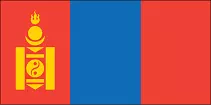Shockingly, little has changed the Mongol culture over the past thousand years, but of those changes religion is among the most substantial. Buddhism is still the dominant religion, while Islam is also popular, both of which dictate certain aspects of life, such as dress, diet, and relationships. However, the culture is still rooted in the people's nomadic past as many continue to live in gers, their nomadic homes, and animals continue to be an important part of their culture and the basis of their diet.
What has changed in recent times is the introduction of technology and infrastructure as many former nomads are now settling and urbanization is occurring. Roads and transportation are easily accessible and the cities are growing at the expense of rural life. The cities today are home to most of the country's jobs as entire areas on the outskirts of cities are made up of gers. Foreign powers have also become more involved in local politics and have changed the culture, most particularly the Soviet Union in the mid-1900s and China in more recent times as a communist mentality has been introduced.
Despite the changing culture and Mongolia's shift to industrialization, the people tend to cling to their historic cultural roots as the people remain humble, modest, and united. Today, modern technology is available as cars, modern housing, and fast foods are more widely accessible, but these items are not preferred or affordable to many, as many continue to live simple lives as they have in the past. The capital is ever-changing and is adopting these new introductions, but even here change is slow.
 The flag of Mongolia contains blue for the sky and red, which represents progress and prosperity. The flag also contains the national emblem, which is called soyombo. This emblem includes symbols for fire, the sun, moon, earth, water, and the yin-yang.
The flag of Mongolia contains blue for the sky and red, which represents progress and prosperity. The flag also contains the national emblem, which is called soyombo. This emblem includes symbols for fire, the sun, moon, earth, water, and the yin-yang.
Name: Mongolia
Independence: July 11, 1921
Capital: Ulaanbaatar
Currency: Tughrik
Population: 3,226,516 (2013 estimate)
Ethnicity: Mongol
Language: Khalkha Mongol
Religion: Buddhist Lamaism